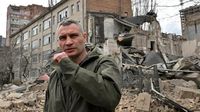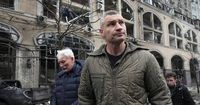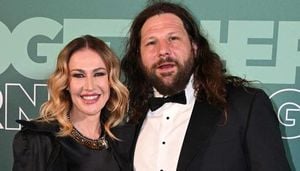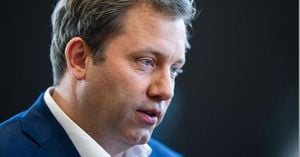In a significant and controversial statement, Kyiv Mayor Vitali Klitschko has suggested that Ukraine may need to temporarily cede territory to Russia as part of a peace deal. Speaking in an interview with the BBC published on April 25, 2025, Klitschko acknowledged the weight of the situation, stating, "One of the scenarios is... to give up territory. It's not fair. But for peace, temporary peace, maybe it can be a solution, temporary." This admission comes on the heels of a devastating missile and drone attack on Kyiv that occurred just a day prior, killing at least 12 people and injuring nearly 90 others.
The context of Klitschko's remarks is critical, as they reflect increasing pressure from U.S. officials, including former President Donald Trump, for Ukraine to consider territorial concessions in order to facilitate peace negotiations with Moscow. Klitschko's comments mark him as one of the first senior Ukrainian politicians to publicly entertain the notion of temporary territorial compromises, though he firmly stated that Ukrainians would "never accept occupation" by Russia.
The recent Russian assault on Kyiv was one of the deadliest in months, raising alarms about the ongoing conflict, which has seen Russia controlling approximately 20% of Ukrainian territory since its full-scale invasion in 2022. Klitschko, a former boxing champion who has been a prominent figure in Ukraine's political landscape, emphasized his responsibility for the capital and the dire need for a resolution to the conflict.
Despite Klitschko's candidness, President Volodymyr Zelensky has taken a firmer stance against any territorial concessions. Earlier this week, Zelensky reiterated that Ukraine has not received any official proposals from the U.S. or other partners regarding territorial compromises. He has consistently stated that Kyiv will not recognize any occupied territories as Russian, maintaining that such actions violate Ukraine's sovereignty. Zelensky's position was made clear when he rejected a U.S. peace proposal that implied recognition of Crimea as Russian territory, which was annexed by Moscow in 2014.
In the wake of Klitschko's interview, tensions between him and Zelensky have resurfaced. Klitschko has previously accused Zelensky's administration of undermining his authority and has expressed frustration over the lack of communication regarding potential peace talks. When asked if Zelensky had discussed any details of a possible settlement with him, Klitschko bluntly replied, "No," indicating a significant rift between the two leaders.
The political landscape in Ukraine is further complicated by Trump's recent comments, where he criticized Zelensky for allegedly obstructing peace negotiations. Trump stated, "Nobody is asking Zelensky to recognize Crimea as Russian territory but, if he wants Crimea, why didn’t they fight for it eleven years ago when it was handed over to Russia without a shot being fired?" This statement has sparked backlash and concern among Ukrainian officials who view Trump's remarks as undermining their sovereignty.
Ukrainian government spokesperson Heorhii Tykhyi also weighed in on the matter, asserting that there is no chance Kyiv would agree to cede any land to stop the war. Tykhyi stated, "Ukraine is a sovereign country, united within internationally recognized borders. This position of Ukraine is immutable and will never change. I can tell you: never. No matter how many years, months, it will never change. Ukraine, as it was, will be within internationally recognized borders."
As diplomatic discussions continue, the situation remains precarious. Klitschko's comments may have opened a Pandora's box of debates regarding the future of Ukraine's territorial integrity. While he acknowledges the potential necessity of making painful decisions for the sake of peace, the overwhelming sentiment among many Ukrainians is a refusal to accept any form of occupation.
In summary, the ongoing conflict in Ukraine has reached a critical juncture, with leaders like Klitschko and Zelensky navigating the treacherous waters of diplomacy, public opinion, and national sovereignty. The stark contrast between Klitschko's willingness to consider temporary concessions and Zelensky's steadfast refusal to acknowledge any loss of territory highlights the complexities of the current political climate. As the war continues to ravage the nation, the question of how to achieve peace without compromising Ukraine's territorial integrity looms larger than ever.





